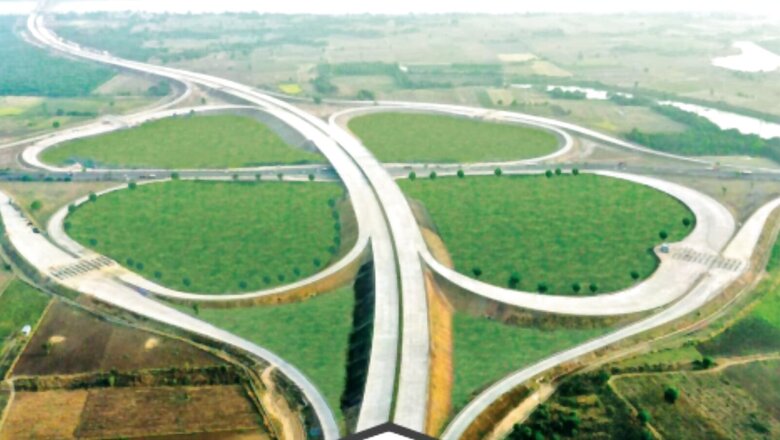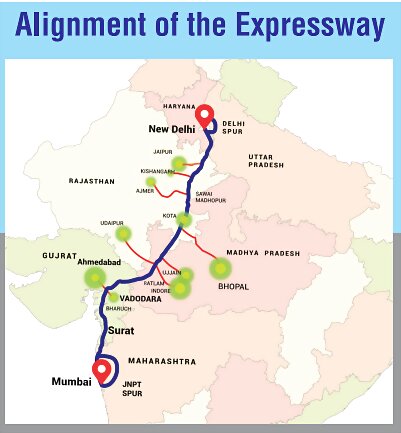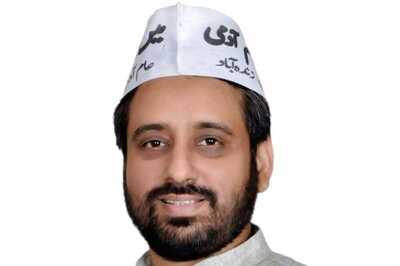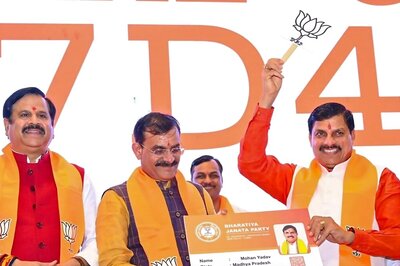
views
Speeding up the work on the Delhi-Mumbai expressway, the National Highways Authority of India (NHAI) has invited bids for the Advanced Traffic Management System (ATMS) on the e-way that will enhance connectivity between India’s national and financial capitals.
The Delhi-Mumbai expressway, covering Delhi, Haryana, Rajasthan, Madhya Pradesh, Gujarat, and Maharashtra, is being developed at a cost of about Rs 1 lakh crore. Once completed, the 1,386 km expressway will be the longest in India. It is expected to halve the commute time between Delhi and Mumbai, from nearly 24 hours to 12 hours, and shorten the distance by 130 km. On Saturday, union road transport minister Nitin Gadkari said the Delhi-Mumbai e-way is expected to be completed by the end of the month.

In the tender notice or ‘request for proposal’ issued last week, the NHAI said it has installed various ATMS equipment for implementation of Intelligent Transportation System (ITS) on national highways across the country, adding it is an effective tool to enhance road safety, make road-travel efficient and sustainable, and enable stress-free travel.
“Advanced traffic management system is composed of field equipment and sensors that collect the information on road conditions, traffic conditions, violations, incidents, and weather / environmental conditions and send it to the Traffic Management Centre (TMC) for processing. ITS provides necessary information on road, traffic, incidents, weather, and environment to road users, and alerts regarding violations and incidents to the enforcement agencies/rescue team 24 hours a day, 365 days a year, to ultimately ensure safe and smooth traffic,” the tender notice reads.
The component systems comprising ITS include: Traffic Monitoring Camera System (TMCS); Video Incident Detection System (VIDS); Variable Message Sign (VMS); Vehicle Speed Detection System (VSDS) with Automatic Traffic Counter and Classifier (ATCC) and Travel Time Measurement System (TTMS) functionalities; Digital Transmission System (DTS); Central Processing System (CPS); and Facility Monitoring System (FMS). Among these, TMCS, VIDS and VSDS are for data collection and enforcement, while VMS is for information dissemination.
“The ITS system shall intelligently monitor the entire stretch with the help of comprehensive CCTV surveillance, ANPR (Automatic Number Plate Reader) system, and video incident detection system. The system will be able to automatically detect any incident on the stretch and will alert the route patrol team/rescue team about the incident, hence will be able to reduce the response time and help the rescue team to provide the required assistance to the accident victims within the Golden hour,” the notice said.
The last day for the bid is January 23, 2023, and the date for the declaration of eligible/ qualified bidders is yet to be notified.
The expressway, passing through Delhi, Haryana, Rajasthan, Madhya Pradesh, Gujarat and Maharashtra, will improve the connectivity to economic hubs like Delhi, Mumbai, Jaipur, Kishangarh, Ajmer, Kota, Chittorgarh, Udaipur, Bhopal, Ujjain, Indore, Ahmedabad, Vadodara, and Surat, bringing economic prosperity to millions.
This will generate annual fuel savings of more than 320 million litres and reduce CO2 emissions by 850 million kg, which is equivalent to the planting of 40 million trees. Over two million trees and shrubs are planned to be planted along the highway as part of NHAI’s commitment towards environment conservation.
Minimising environmental and wildlife impact has been a cornerstone of the Delhi-Mumbai expressway. The e-way is the first in Asia and only the second in the world to feature animal overpasses to facilitate unrestricted movement of wildlife.
The expressway will also include two iconic eight-lane tunnels, which are a testament to the engineering prowess of the country, one tunnelling through Mukundra sanctuary without disturbing the endangered fauna in the region for four kilometres and the second four-kilometre eight-lane tunnel will pass through the Matheran eco-sensitive zone.
The e-way kick-started in 2018 with the foundation stone being laid in March 2019. The target date for completion of the complete corridor of the Delhi-Mumbai expressway was January 2023.
Read all the Latest India News here


















Comments
0 comment